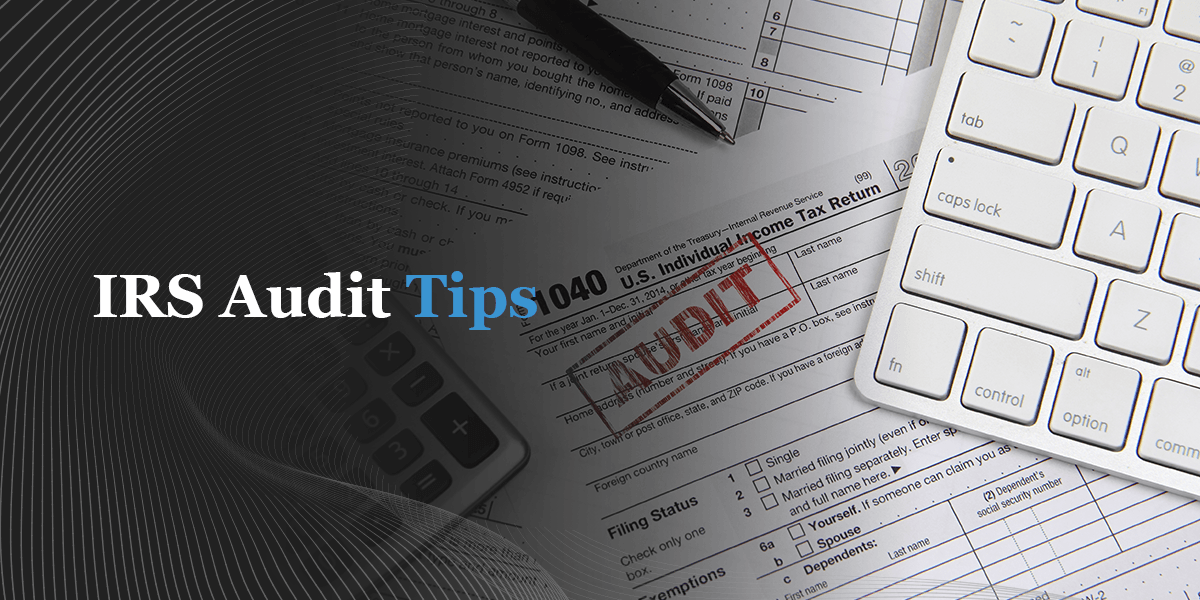
100+ Years of Combined Tax Resolution Experience.
100+ Years of Combined Tax Resolution Experience.
Tax Audits are one of the most terrifying things a taxpayer can endure. Most taxpayers don’t know what being audited by the IRS entails and usually don’t know what to do if they are audited. IRS audits can be confusing to most taxpayers as most don’t know what the IRS is looking for when they determine who to audit each year and what they are looking for when they perform the tax audit. Tax audits can be a long and exhaustive process that examines every aspect of your financial history for the tax year in question. The average taxpayer won’t be audited in their lifetime, but that doesn’t mean it won’t happen to you. The best way to help yourself in a tax audit is to know why and what a tax audit means and to get a tax attorney to help represent you. Here is the information you need to know if you are selected for a tax audit by the IRS. Finding tax audit help can be hard but knowing the facts can make it easier.
Table of Contents
Types of Tax Audits
There are a few different types of audits — a mail audit, office or desk audit or a field audit. Most IRS audits are conducted by mail, and only a quarter of the audits are conducted in person by the IRS.
Mail Audit
A mail-in audit is basically just a paperwork request because the IRS is either missing paperwork or needs paperwork for an item on your tax return. Typically, mail tax audits involve simple issues, such as:
- Alimony
- Unreported income
- Education credits
- Dependent claims
A mail tax audit is very deadline-oriented, and it is important that you mail in the items requested. The IRS could ask for any of the following:
- Bills
- Receipts
- Legal papers
- Medical records
- Canceled checks
- Loan agreements
Mail audits are simple and less intrusive, and many times, the audit ends in a change to the tax return.
Office Audit
In-office tax audits are a little bit more serious than mail-in audits and tend to be more in-depth than others. If you face an office audit, the IRS is most likely looking for improper deductions or underreported income.
During this type of tax audit, you’ll have a meeting with an IRS auditor referred to as a Tax Compliance Officer. This auditor will discuss your tax return with you and inspect your records. Office audits are conducted to ensure you are reporting your income accurately and paying the correct amount of tax. To support your federal tax return, you may need to provide some paperwork.
Field Audit
In a field audit, you will meet with an IRS agent known as a Revenue Officer. This meeting could occur at your place of business, home or your tax preparer’s office. Field tax audits revolve around more complicated issues and include a thorough investigation of your belongings and your home or business. This type of audit comprehensively reviews your entire financial record.
During a field audit, the IRS agent will generally request your accounting records and bank statements. If you don’t provide these documents to the agent, they will likely obtain them from your accountant or bank. The agent will examine your lifestyle and compare it against your reported income. If the IRS believes your lifestyle exceeds your income, they may assume you have unreported income.
You will know the time and date of your field audit, as it will be listed in the letter from the IRS. These tax audits vary in length, depending on:
- The complexity of the issues
- The size of the business
- The availability of requested information
- The availability of both parties to participate in meetings
- Whether you agree or disagree with the findings
Speak with a tax attorney at Polston Tax and have us handle the audit process to ensure every step goes smoothly.
How are taxpayers chosen for an IRS tax audit?
The primary objective of the IRS in identifying and selecting returns for examination is to try to promote the highest degree of voluntary compliance. One way you could be selected for an audit is by being randomly selected. Some federal tax returns are selected solely based on a statistical formula. The IRS compares your federal tax return against the “norms” for similar returns. These “norms” are created from audits of a statistically valid random sample of returns. Another way you could be selected for an IRS audit is if you have issues or transactions with another taxpayer, such as a business partner or investor, that was selected for an audit.
It’s important to know that the primary IRS statute of limitations for a tax audit is three years from when the federal tax return was filed. It is important to note there are many exceptions that give the IRS six years or longer.
The IRS typically examines 50,000 random federal tax returns each year for random examinations. Of those 50,000 only about 2,000 taxpayers will have to submit a full tax audit. If you have an out-of-the norm tax return, you usually are on the list to get audited. The amount of people the computer chooses for the tax audit is always a lot larger than the list of people who actually get audited.
Now there are some steps you can take to help your chances of being chosen for an IRS Tax audit become smaller. You should first and foremost make sure your taxes are filed correctly. Make sure all the numbers match and add up to your forms. It may seem simple, but double check they your numbers add up correctly. One of the most common mistakes the IRS sees on a federal tax return is incorrect math. Use a calculator or double check yourself. Don’t round up numbers or guess if you’re not sure. If you’re trying to choose whether to file online or a through a paper return, file online. 21% of paper filers have some type of errors on their federal tax return compared to the 1% of online filers. If you take deductions on your federal tax return, make sure you have the proper substation to help back up those deductions. Keep in mind filing your tax return late does not help you avoid being audited by the IRS. The IRS can audit anyone for up to three years after the return is filed, not when it is due.
How will I know if I am selected for an IRS Tax Audit?
If you are selected for an IRS tax audit you will be notified by mail. The initial letter from the IRS will include instructions on how to proceed. You will get either a request for paperwork audit, an in-office audit, or a field audit.
When a taxpayer is first selected for audit, he or she will be notified by mail. This initial contact letter will outline whether you are facing a correspondence, in-office, or field exam as well as what tax period(s) and items are being examined. Additionally, you will receive a deadline date to provide paperwork needed to prove the items being examined.
What to Do in a Tax Audit
If you are chosen for an IRS audit, there are some things you need to do and some things you should avoid while you are being audited.
- Take immediate action: Ignoring the audit will not be beneficial for the taxpayer. If you are thinking that it will just go away if you ignore it, you are wrong. The IRS will not forget about you or the taxes they think you will owe.
- Tell the auditor the truth: Lying to the auditor is a federal crime. Be upfront and present the facts to the IRS auditor. They will find out if you are lying or trying to hide something. If the auditor thinks you are lying or hiding information or even money, they will not hesitate to reach out to a third party, like family, friends or business partners, and question them if they think they will give them the information.
- Keep in mind the IRS auditor doesn’t have the final say in the audit: If you do not agree with the auditor’s findings, you can appeal their decision. You can file an appeal, and then you will be able to present your case to an appeals officer. If you still don’t agree with the appeals officer’s findings, you can dispute those findings in Tax Court.
- File all your tax returns before meeting with the auditor: If you are selected for an audit, it is very important that you file all your missing tax returns. If you have missing tax returns during the audit, the auditor can file the returns for you, which is called a substitute for return. They will not claim any deductions, credits or dependents for you, which can lead to a large tax balance.
- Be prepared for the audit: Not being prepared can lead to frustration on the auditor’s part and could lead to you not being able to fully present your case. You are your best advocate in an audit. Being prepared is especially important if you don’t have a tax attorney. You need to know what the tax code means and how it is applied so you can plead your case to the auditor.
- Elevate issues to the auditor’s manager: You might feel like the audit is dragging on forever, and you are not getting anywhere with the auditor. If this arises, you should ask to speak with the auditor’s manager. They will listen to your side of the case and will intervene if needed on your behalf.
- Get all requested information in writing: Make sure you have everything in writing from the auditor. If they forget or get confused over what you agreed on, you then have the proof to show them. Don’t be afraid to take charge of the audit. You can request that things be put into writing so you have a record of it. This will benefit you if you decide to appeal the audit findings.
- Remember and obey deadlines: In an audit, there are a lot of deadlines that include the audit appointment, deadlines to provide information, deadline to respond to the initial audit report, the deadline to petition IRS appeals, the deadline to petition tax court and many others. As a taxpayer, it is your job to remember all these deadlines. The auditor will not remind you of them.
- Contest the penalties: Typically, taxpayers do not argue when penalties are applied. In the past, IRS auditors have been criticized for tacking on extra penalties to taxpayers. It is your job as the taxpayer to pay attention to everything the auditor is doing. This could potentially save you money.
- Seek a higher authority: IRS audits are no easy walk in the park. You need to have knowledge of how to navigate the audit, know your rights as a taxpayer and how to advocate for yourself. Unless you are a seasoned veteran with audits, it would be in your best interest to seek advice from a tax professional at Polston Tax. Tax professionals deal with the IRS every day and will be able to navigate you through the audit and fight for you on your behalf.
Possible Outcomes of a Tax Audit
There are three possible conclusions to an IRS tax audit — agreed, disagreed or no change.
- Agreed: This refers to an audit in which the IRS proposes changes to your tax return and the amount of taxes you owe, and you agree to these changes. Possible changes include the amount you owe or the deductions you take.
- Disagreed: This refers to an audit in which the IRS proposes changes to your tax return that you disagree with.
- No change: This refers to an audit in which you have substantiated the items being reviewed, and the result is no changes to your tax return or the taxes owed.
If you agree with the proposed changes, you will sign an examination report or a similar form. If you disagree with the findings from the audit, you can go through mediation or file an appeal if the statute of limitations has not expired. The best way to appeal an IRS decision on an audit is by having a tax attorney from Polston Tax on your side.
Frequently Asked Questions about Tax Audits
What documents do I need for an IRS Tax Audit?
The types of documents you need for an audit can vary by the type of audit you’re going through and the agent who is doing the audit. The IRS agent will tell you directly what items and paperwork they need. This list can include hard copies of documents or electronic ones. Ask your agent what is acceptable. Typical documents the IRS will ask for in a tax audit are receipts, bills, canceled checks, legal papers like divorce settlements or property acquisitions, loan agreements, tickets, medical or dental records, theft or loss documents, employment documents, or a Schedule K-1. The law requires you to keep all records you used to prepare your tax return for at least three years from the date the tax return was filed.
How do I know the IRS got my response or document?
With any delivery service you use, you can always request confirmation that the IRS has received it. You can also call or contact the agent you are working with to see if they received it. If you do not hear back from the IRS, you may try calling the IRS agent or the IRS directly to make sure they got your response or documents. If they don’t receive your documentation, you could face penalties or have collection action taken against you.
How far back can the IRS go to audit my return?
Generally, the IRS can include tax returns filed within the last three years in an IRS tax audit. If the IRS finds a substantial error, they may add additional years, but they usually don’t go back more than the last 6 years. The IRS tries to audit tax returns as soon as possible after they are filed, but it could be a year or so after you file that you get audited.
How long does an IRS Tax Audit take?
The length of your IRS tax audit can vary depending on the factors of your audit. The length of your tax audit depends on the type of audit, the complexity of the issues, the availability of information requested, the availability for parties to have meetings and your agreement or disagreement with the findings. Getting the documents needed to the IRS can help move your audit along but doesn’t guarantee it will be done sooner. It’s important to meet all the deadlines given to you by the Revenue Officer or Tax Compliance officer, not meeting these deadlines can make the process longer and slower.
Get Tax Information and Advice From Polston Tax
Trying to navigate an audit can be difficult, especially if you have a lot going on personally or in your business. That’s why we are here to help you. We know it can get tricky and stressful, and that’s why the tax attorneys at Polston Tax are ready to represent you against the IRS and help you file an appeal if necessary.
Since 2001, we have offered tax audit representation services to people like you. Our team includes tax attorneys and accomplished tax professionals with extensive experience representing both individuals and businesses during the auditing process. We know the language, and we know the tax law and how it can be applied. Contact us at Polston Tax to schedule your free consultation.
Read More About Tax Audit Representation
Additional Readings

The IRS conducts audits to verify income and expenses claimed on tax returns. For 2020, the IRS audited 509,917 tax returns, which resulted in recommended additional tax of more than $12.9 billion. While your chances of getting audited are low, it is still possible to get selected by the IRS. Sometimes you may be audited simply for having a complicated...

Many Americans are concerned about having the IRS audit their income tax returns. Of course, filing your tax return on time doesn’t mean that you are safe from an IRS audit or from the IRS coming after you. In fact, the IRS can look into your return long after you filed it. While it’s important to get your return in by...

Tax season can be stressful and overwhelming for everyone. Aside from filling out forms, collecting your receipts from the past year and ensuring you’re doing everything correctly, many people fear that they will do something wrong and get audited by the IRS. There is nothing worse than getting all your tax documents together, filing your...

Each year, the IRS processes around 261 million tax returns. From individuals, 90% of these are filed electronically. The IRS expects individuals to file an annual tax return each year. Yet, many don’t file yearly or even haven’t filed for several years. In fact, in 2020, the IRS estimates it was owed over $114 billion in back taxes, penalties,...


Tax Audits are one of the most terrifying things a taxpayer can endure. Most taxpayers don’t know what being audited by the IRS entails and usually don’t know what to do if they are audited. IRS audits can be confusing to most taxpayers as most don’t know what the IRS is looking for when they...
